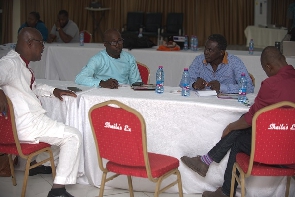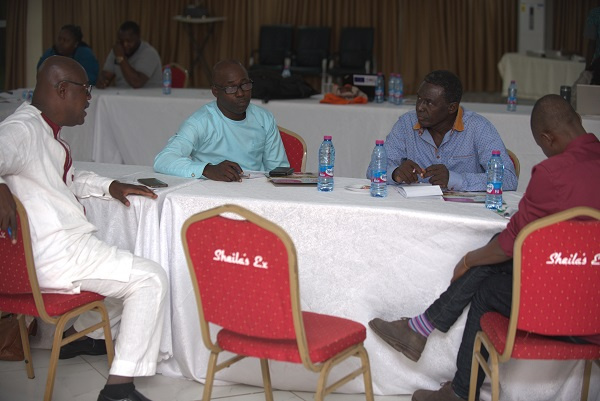 Some of the members during the meeting
Some of the members during the meeting
Committee members of the ‘Landscapes and Environmental Agility across the Nation’- LEAN project, recently ended the 4th Steering Committee Meeting which was scheduled for 7th-8th June 2023 in Sunyani.
The meeting was organized to update the Steering Committee Members on the project's progress in the first six months in year three (3) and discuss the Gaps and Opportunities to improve project efficiency, effectiveness, and impact of the LEAN Project on farmers.
The Landscapes and Environmental Agility across the Nation (LEAN), is a four-year project funded by the European Union’s flagship GCCA+ initiative that aims to conserve biodiversity, build climate resilience, and reduce emissions from land-use changes in the savannah, high forest, and transition zones of Ghana.
Nana Charles Owusu, the Western North Regional Chief Farmer in Sefwi Akontobra, and the chairman of the steering committee, who replaced Mr. Mohammed Assah in his speech said the LEAN Project will be a great hallmark for the rest of the generation as everyone and especially farmers have benefited without paying for it.
According to Nana Charles Owusu, the project is a laudable one that needs the attention of all the farmers in the community and he will therefore do everything in his power to lead the Committee to ensure that the project is maintained and protected at all times. He also urged the implementers of the LEAN project to continue the good work by educating the various communities on Climate smart agriculture among others.
The members were updated on the progress of the transition zone where 60 community nurseries have been established, 60 community members employed and over 400,000 tree seedlings raised and distributed to farmers.
The Project Manager, who represented the zone, Mr Daniel Kofi Abu said community-led reforestation schemes in fallow lands and cocoa landscapes alongside assisted natural regeneration (ANR) of endangered transitional zone species of economic importance has been implemented and approximately 175 hectares mapped. Also the organisations (Tropenbos and Ecocare) have built capacity of local communities and authorities in Integrated Landscape Management ( ILM) through training, sensitization, strengthened infrastructure and governance amongst others.
In the Savannah Zone, World Vision Ghana has trained community fire volunteers on prevention and control of wild fires in Farmer Managed Natural Regeneration (FMNR) up scaled communities, Facilitated scaling-up mechanisms based on farmer-to-farmer visits, and the support of experienced farmer-disseminators, Established Farmer Managed Natural Regeneration (FMNR) hubs and communities of practice for co-learning and developed land use/land management plans in for selected communities where 237 stakeholders (168 males + 69 females) in 25 communities engaged on land use development plan amongst others.
Rainforest alliance, implementers of the project in the high forest zone was represented by Mr Emmanual Bawuah Antwi. In his update he said they have established and inaugurated socially inclusive governance system which is the three (3) Landscape management boards (LMBs), Facilitated and registered 9782 trees for 160 farmers. Also 120 farmers have been trained on income diversification enterprises whiles 69 farmers have been provided with start-up kits as seed capital and 200 new farmers being trained.
In 2020, the project commenced and is being implemented by a consortium of these four partners and working closely with the European Union (EU) Delegation, private sector, local communities, and core national partners, to catalyze systemic changes across the three-biodiversity significant and economically important landscapes to help translate the sustainability commitments into workable solutions on the ground.


